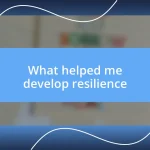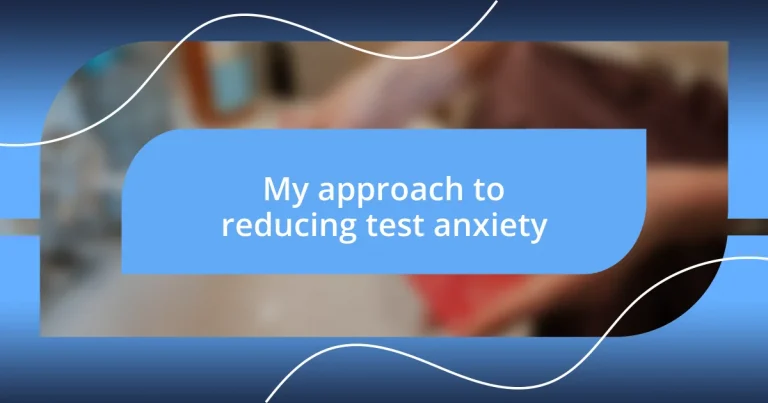Key takeaways:
- Understanding and identifying personal triggers, such as environmental factors and negative self-talk, is essential for managing test anxiety.
- Practicing relaxation techniques, effective study habits, and mock testing can significantly reduce anxiety and build confidence.
- Maintaining a positive mindset through gratitude, visualization, and seeking support from others fosters a more empowering approach to exams.
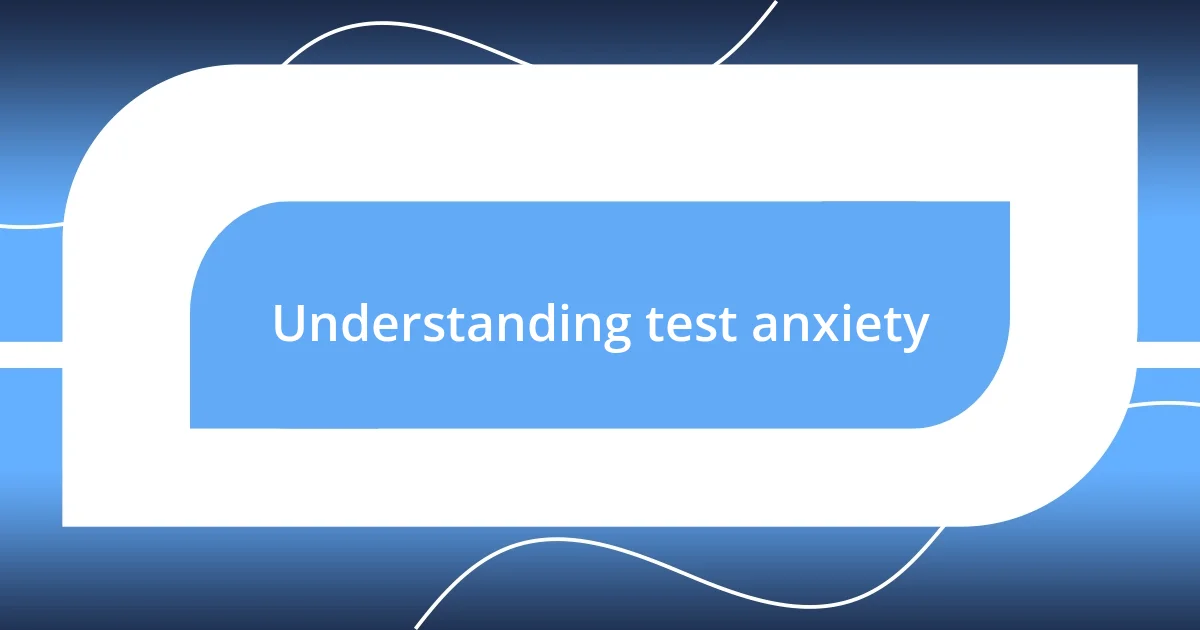
Understanding test anxiety
Test anxiety can feel like an overwhelming tide that crashes down when you least expect it. I remember a time when just the thought of an upcoming exam left me with knots in my stomach and racing thoughts. It’s almost like this invisible pressure builds up, making you question your abilities, even if you’ve prepared extensively. Can you relate to that feeling?
What’s fascinating is that this anxiety isn’t just about the fear of failing; it can stem from a deep-rooted fear of judgment from peers or even a desire to meet personal expectations. I once had a friend who would study tirelessly but still felt a knot of dread during tests, worrying about how his performance would reflect on him. It raises an important question: how often do we let the fear of how others perceive us dictate our own performance?
Ultimately, understanding test anxiety requires digging into the emotional layers beneath it. It isn’t simply a challenge to overcome; it’s a reminder that our mental state can greatly affect our performance. When I began to view my anxiety as a signal to prepare and not as a barrier, it transformed my approach entirely. Have you ever thought about how reframing your perspective could change your experience?
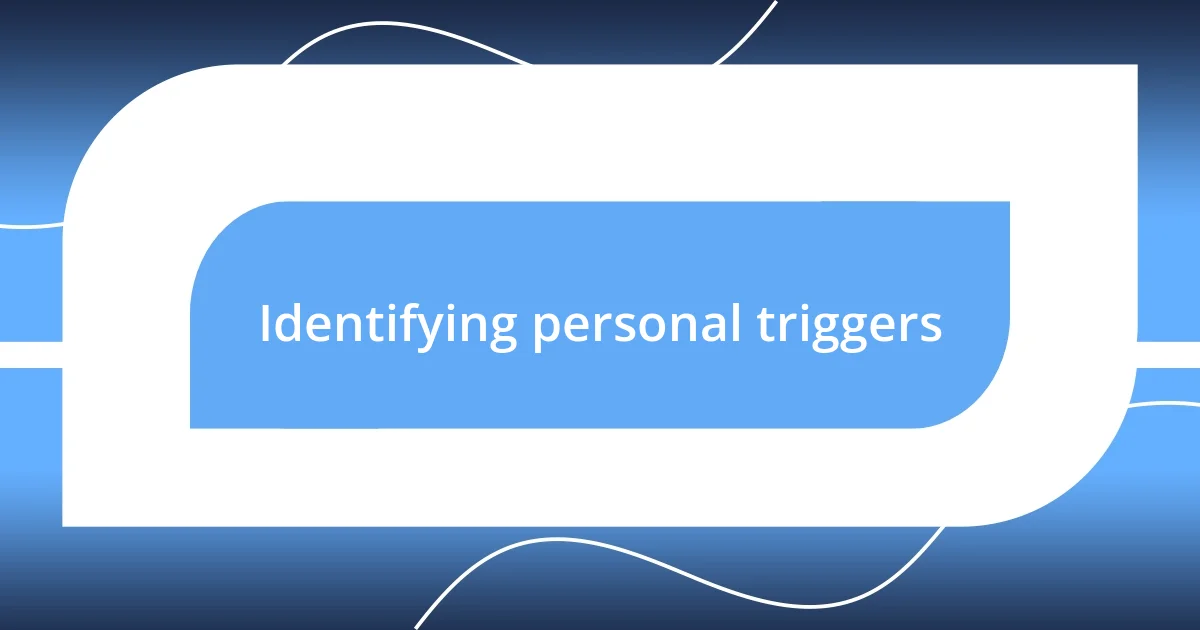
Identifying personal triggers
Identifying personal triggers is a crucial step in managing test anxiety. For instance, I learned that certain situations—like taking tests in a cramped room—heightened my discomfort. That cramped feeling, combined with the ticking clock, often sent my mind racing into a frenzy of worry. Have you ever noticed how your environment can amplify your anxiety?
Reflecting on my experiences, I realized that specific memories also triggered anxiety. For example, I had a particularly stressful encounter in high school where I blanked out during a major exam, which made me dread similar tests in the future. This taught me that recognizing these memories as triggers helps me prepare mentally and emotionally for future challenges. Have you had similar experiences that haunt you?
Finally, I found that negative self-talk was a significant trigger as well. When I told myself I wasn’t prepared enough, it fueled my anxiety even further. Becoming aware of this internal dialogue allowed me to reassess and change my mindset. Have you considered how your thoughts might be contributing to your anxiety?
| Trigger Type | Personal Example |
|---|---|
| Environmental Factors | Taking tests in cramped rooms increased my discomfort. |
| Memory Triggers | A stressful high school encounter led to lasting anxiety about exams. |
| Internal Dialogue | Negative self-talk made me feel unprepared and fueled my anxiety. |
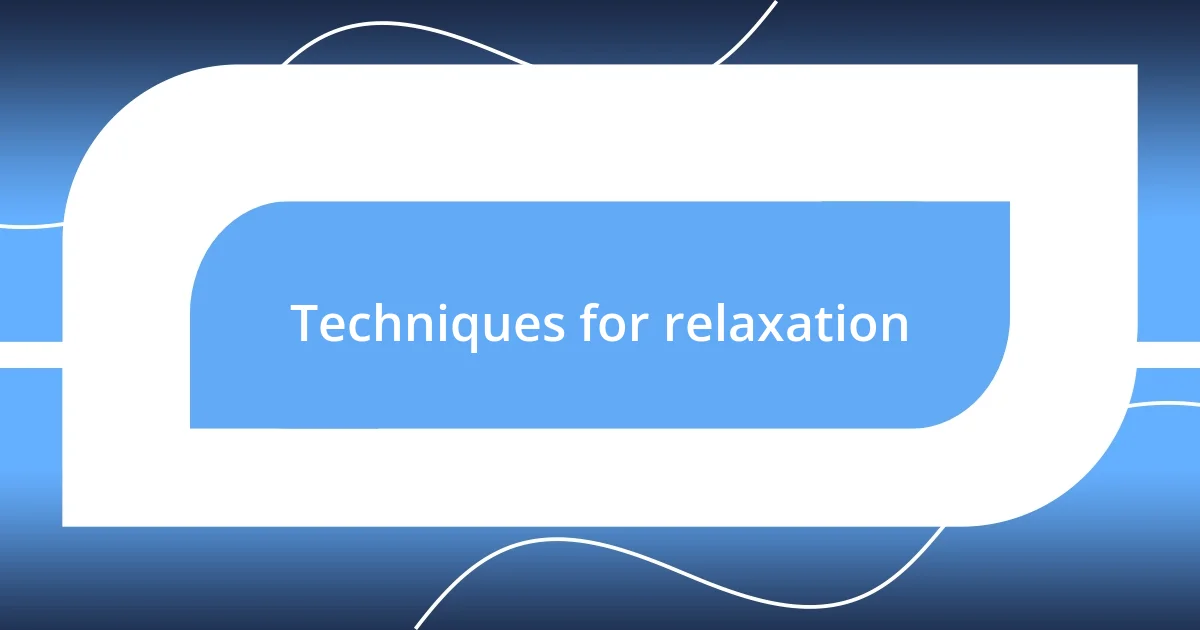
Techniques for relaxation
Practicing relaxation techniques can significantly alleviate test anxiety. Personally, I found deep breathing exercises to be a lifesaver. When I took a moment to focus on my breath, inhaling deeply through my nose and exhaling slowly through my mouth, I felt the tension start to melt away. It’s like hitting a reset button for my mind.
Here are some effective techniques that you might find helpful:
- Deep Breathing: Inhale deeply through your nose for a count of four, hold for four, then exhale through your mouth for six. Try this for a few cycles.
- Progressive Muscle Relaxation: Tense and then release each muscle group, starting from your toes and working your way up to your head. I used to feel my body physically unclenching, which was incredibly soothing.
- Visualization: Picture a peaceful place where you feel calm and secure. I often imagine a serene beach, and I can almost hear the waves as I visualize it.
- Mindfulness Meditation: Take just a few minutes of quiet time to focus on the present moment. I’ve found that even a couple of minutes helps center my thoughts.
Incorporating these techniques into my routine made a noticeable difference. Whether I was cramming the night before an exam or sitting at my desk minutes before the test started, having these relaxation tools in my back pocket provided a comforting sense of control. The more I practiced, the more grounded I felt, as if I was preparing my mind for success.
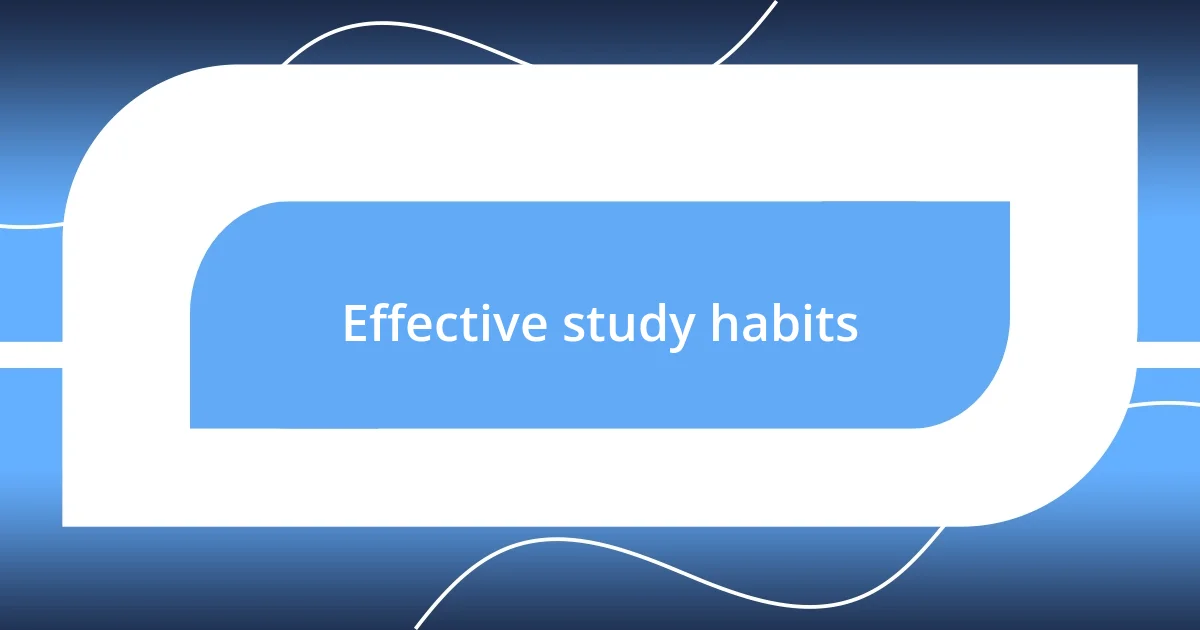
Effective study habits
Effective study habits can create a solid foundation for overcoming test anxiety. One strategy that transformed my approach was breaking my study sessions into shorter, manageable chunks. Instead of cramming for hours, I’d set a timer for 25 minutes to focus intensely before taking a 5-minute break. This method not only kept my attention sharp but also made me feel less overwhelmed. Have you ever tried working in intervals?
Another habit that I found valuable is varying my study materials. I remember when I focused solely on textbooks, my mind would wander, and I’d lose interest. By integrating videos, flashcards, and even group discussions into my routine, I felt more engaged and retained information better. Adapting my learning style helped me discover what truly works for me. Do you mix up your materials to keep things fresh?
Lastly, I learned the importance of a conducive study environment. For me, studying in a quiet corner of my favorite coffee shop transformed my focus. The ambient noise became a comforting backdrop rather than a distraction. I would often pack my favorite snack to enjoy during breaks, which made the whole experience enjoyable. What elements do you find essential for your ideal study space?
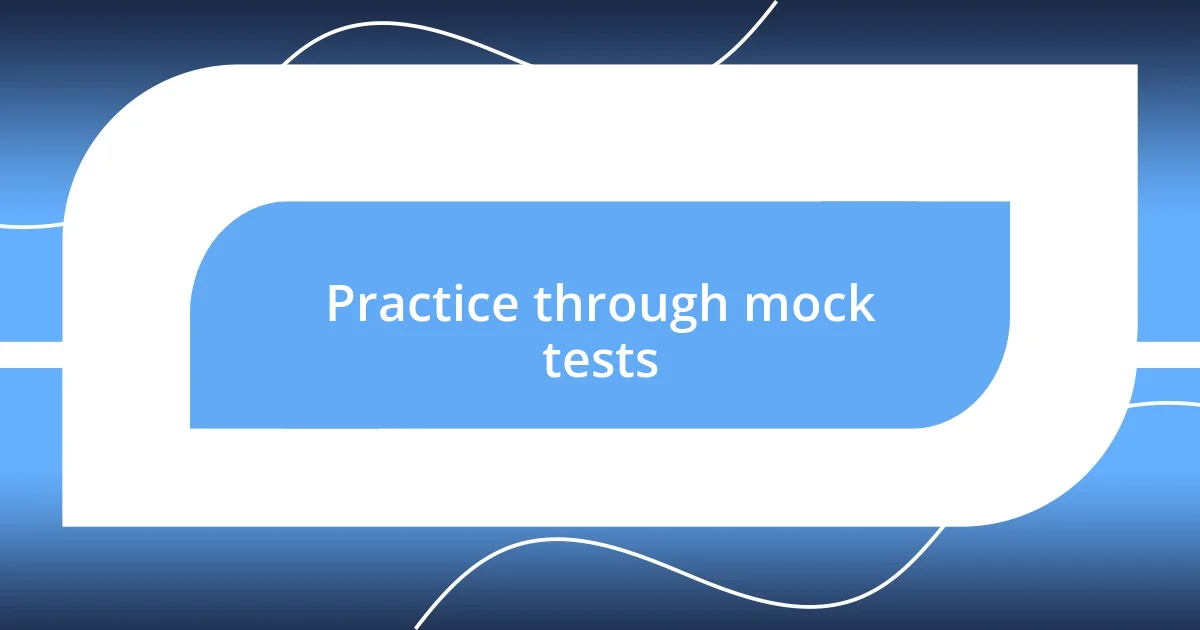
Practice through mock tests
Practicing through mock tests has been a game changer for me. When I first started taking them, I’d treat each one like a real exam. This approach not only helped me get accustomed to the format but also revealed the areas where I struggled. It’s amazing how simulating the actual testing environment can reduce that daunting pressure on the big day.
I remember the first mock test I took—it felt nerve-wracking yet oddly familiar. By timing myself and sticking to a structured format, I realized how crucial it was to manage my time effectively. I found that after a few of these practice runs, I was better at pacing myself during the real exams. Have you ever noticed how confidence builds when you know what to expect?
Furthermore, reviewing my mock test results became an invaluable part of my learning process. Rather than seeing mistakes as failures, I learned to view them as opportunities for growth. It was enlightening to analyze my wrong answers and pinpoint where I needed improvement. This way, when I walked into the actual exam room, I felt like I had already faced and conquered the challenge. Isn’t it reassuring to enter an exam knowing you’ve prepared through the experience of mock testing?
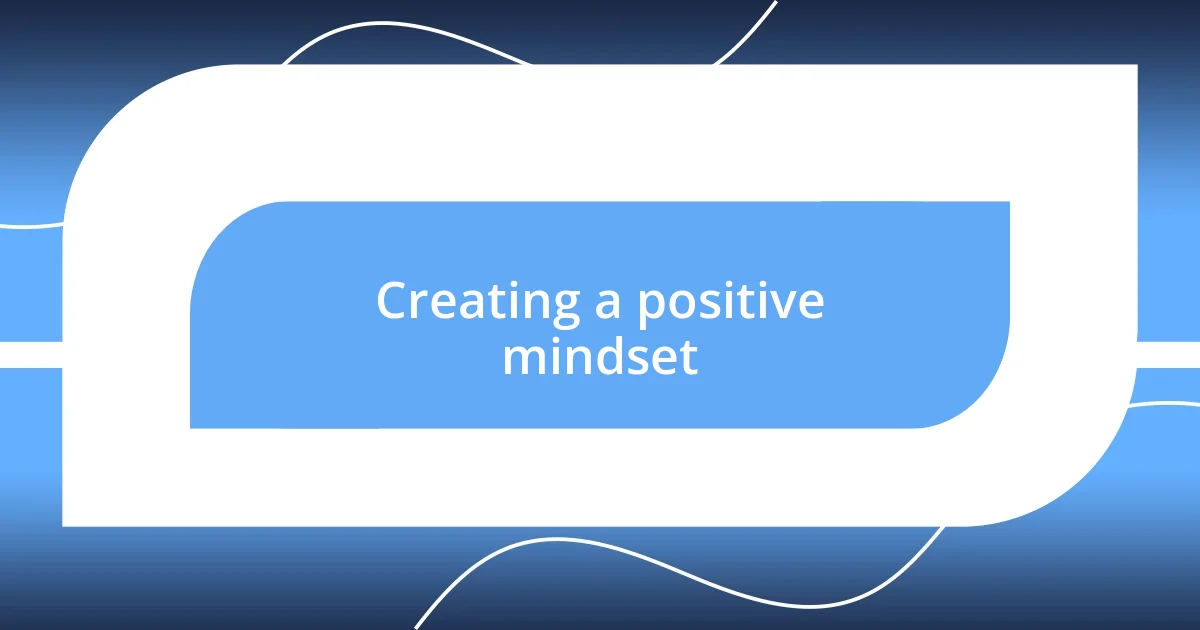
Creating a positive mindset
Maintaining a positive mindset can be transformative, especially when it comes to tackling test anxiety. I’ve found that starting each study session with a brief moment of gratitude sets the right tone. Instead of allowing negative thoughts to creep in about my abilities, I focus on what I’m thankful for: my resources, my support system, and the opportunity to learn. Have you ever just paused to think about what you appreciate in your academic journey?
Visualization has also played a huge role in my mindset shift. Before I begin studying, I take a moment to picture myself acing the exam and feeling that rush of relief and joy afterward. This simple exercise not only boosts my confidence but also allows me to create a mental roadmap of success. It’s fascinating how powerful our imaginations can be; have you given yourself permission to dream about your success?
Finally, surrounding myself with positive influences makes a difference. I consciously choose to engage with friends who uplift me and share their own study successes. I remember a time when I felt overwhelmed, but my study group celebrated every small victory together; it transformed my perspective on exams from daunting challenges to exciting opportunities. Who are the people that inspire you to keep pushing forward?
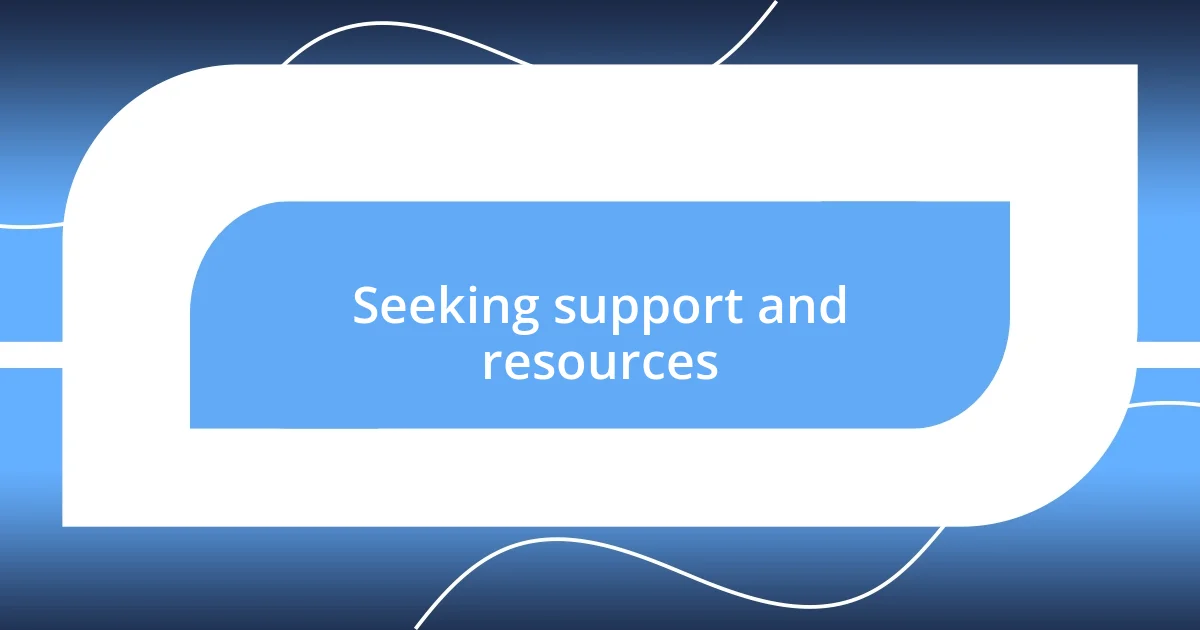
Seeking support and resources
Seeking support can be one of the most effective strategies for managing test anxiety. I recall a period when I was struggling with overwhelming stress, and reaching out to a mentor made all the difference. Just having someone to talk to about my fears provided instant relief. Have you ever found comfort in someone else’s perspective?
Additionally, I discovered a wealth of resources—like study groups and online forums—where students shared their experiences and coping techniques. Once, I joined a local study group, and not only did we tackle difficult subjects together, but we also shared our own strategies for handling anxiety. The sense of community reminded me that I wasn’t alone in this struggle. Have you explored any groups that resonate with you?
Lastly, professional resources like counseling services can provide tools tailored to reduce anxiety. I remember attending a workshop focused on stress management techniques, and it was eye-opening. The strategies I learned, such as relaxation exercises and mindfulness, became part of my daily routine. Isn’t it empowering to know that there are experts ready to support us through these challenges?







